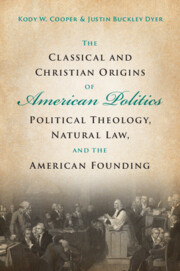 The Classical and Christian Origins of American Politics
The Classical and Christian Origins of American Politics Book contents
- The Classical and Christian Origins of American Politics
- The Classical and Christian Origins of American Politics
- Copyright page
- Dedication
- Contents
- Figures
- Acknowledgments
- 1 Introduction
- 2 God and Nature’s Law in the Pamphlet Debates
- 3 Thomas Jefferson, Nature’s God, and the Theological Foundations of Natural-Rights Republicanism
- 4 Reason, Revelation, and Revolution
- 5 Providence and Natural Law in the War for Independence
- 6 Reason, Will, and Popular Sovereignty
- 7 The Law of Nature in James Wilson’s Lectures on Law
- 8 Conclusion
- Index
3 - Thomas Jefferson, Nature’s God, and the Theological Foundations of Natural-Rights Republicanism
Published online by Cambridge University Press: 22 December 2022
- The Classical and Christian Origins of American Politics
- The Classical and Christian Origins of American Politics
- Copyright page
- Dedication
- Contents
- Figures
- Acknowledgments
- 1 Introduction
- 2 God and Nature’s Law in the Pamphlet Debates
- 3 Thomas Jefferson, Nature’s God, and the Theological Foundations of Natural-Rights Republicanism
- 4 Reason, Revelation, and Revolution
- 5 Providence and Natural Law in the War for Independence
- 6 Reason, Will, and Popular Sovereignty
- 7 The Law of Nature in James Wilson’s Lectures on Law
- 8 Conclusion
- Index
Summary
In this chapter, we argue that Thomas Jefferson affirmed the core of classical philosophical theology.Jefferson understood Nature’s God to be a creating, particularly providential, and moralistic being, whose existence and causal relation to the world was essential to the foundations of natural-rights republicanism.For Jefferson, belief in such a God was warranted on the basis of reason, and thus is akin to the propositions that Thomas Aquinas called the preambula fidei. Jefferson’s theology was essential to natural-rights republicanism in that God’s creation and ordering of man to happiness grounded the moral law, human moral equality, and the natural right of property.Jefferson did not adhere to the major tenets of orthodox Christianity as presented in the religion’s earliest creeds, but he nonetheless affirmed the existence of a God of Nature whose attributes included being a providential, moralistic creator. And while Jefferson can appear at times as a philosophical dilettante with scattered thoughts,Jefferson developed a natural theology that has surprising continuities, and some important discontinuities, with the classical natural-law tradition.
- Type
- Chapter
- Information
- The Classical and Christian Origins of American PoliticsPolitical Theology, Natural Law, and the American Founding, pp. 75 - 98Publisher: Cambridge University PressPrint publication year: 2022
